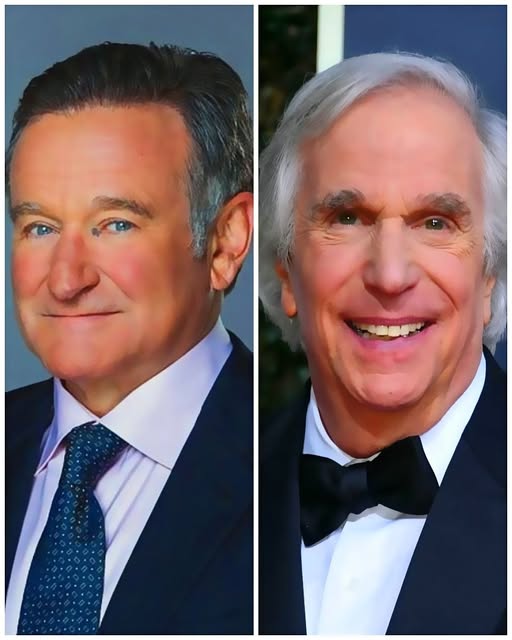
During a 1978 taping of “Happy Days,” the studio buzzed with anticipation. The show was at its peak, and the episode was introducing a strange, outlandish new character, Mork from Ork, played by a little-known comedian named Robin Williams. Behind the scenes, however, Williams was not feeling like a cosmic visitor from another planet. He was overwhelmed. Nervous energy poured out of him as he paced the floor, uncertain about how the live audience would respond. Henry Winkler, who played Fonzie and was already a household name, noticed the young actor’s anxious behavior.
Winkler quietly pulled Williams aside backstage. They sat on a stairwell where the noise of the set was muted, the only sound being the murmur of the crew and Williams’s restless tapping fingers. Winkler spoke calmly, his voice steady. He told Robin to lean into what made him unique. He did not hand him a script or instructions. He simply reminded him of his strength as a performer. “Trust the moment. Let the moment guide you,” Winkler recalled saying in later interviews.
When the cameras rolled, Robin Williams unleashed an unforgettable whirlwind of unscripted brilliance. Wearing a red jumpsuit and antennae, he spun lines, bounced off props, and improvised at a pace that stunned both cast and audience. Even seasoned crew members had to suppress laughter during takes. Henry Winkler watched from the side, astonished. “I was watching someone levitate in front of me,” he said. “That’s when I knew he was going to change comedy forever.”
That guest appearance on “Happy Days” became a career-defining moment. It led directly to the spinoff “Mork & Mindy,” which premiered in 1978 and made Robin Williams a national sensation. But few people at the time knew about that quiet conversation backstage, the moment of reassurance that preceded the storm of genius.
Robin Williams, years later, reflected on that night with deep appreciation. In a 2001 interview with James Lipton on “Inside the Actors Studio,” Williams briefly mentioned how terrified he had been before stepping onto the “Happy Days” set. “I was the new guy on a hit show. Henry didn’t need to do anything, but he saw me, saw that I was shaking. He made me feel like I belonged. That gave me the freedom to fly.” Williams did not elaborate further, but the brief nod to Winkler’s kindness spoke volumes.
Henry Winkler often spoke fondly of Robin in later years, especially after his tragic death in 2014. During an appearance on “The Late Late Show with Craig Ferguson,” Winkler recalled that first meeting. “He was trembling like a leaf. And then suddenly he was a hurricane. It was like watching pure electricity take human form.” Winkler’s voice cracked as he remembered Robin’s laugh. “That laugh… it filled the room before you even heard the joke.”
After Williams’s passing, Winkler gave multiple interviews, each time focusing not on Robin’s fame, but on his humanity. In a conversation with The Hollywood Reporter, he said, “He made everyone feel seen. That night on ‘Happy Days,’ I thought I was helping him. But really, I just got a front-row seat to brilliance. That was the beginning of something none of us could have imagined.”
In 2018, Winkler spoke again about Williams while promoting his memoir “Being Henry.” He revealed that for decades after that episode, whenever they ran into each other, whether backstage at events or at award shows, Williams would still call him “The Fonz” and wink. “He never forgot,” Winkler said. “And neither did I.”
What began as a moment of quiet reassurance blossomed into a pivotal turning point in television comedy. One man saw another not as competition, but as a spark waiting to ignite. And when it did, it lit up an entire generation.
